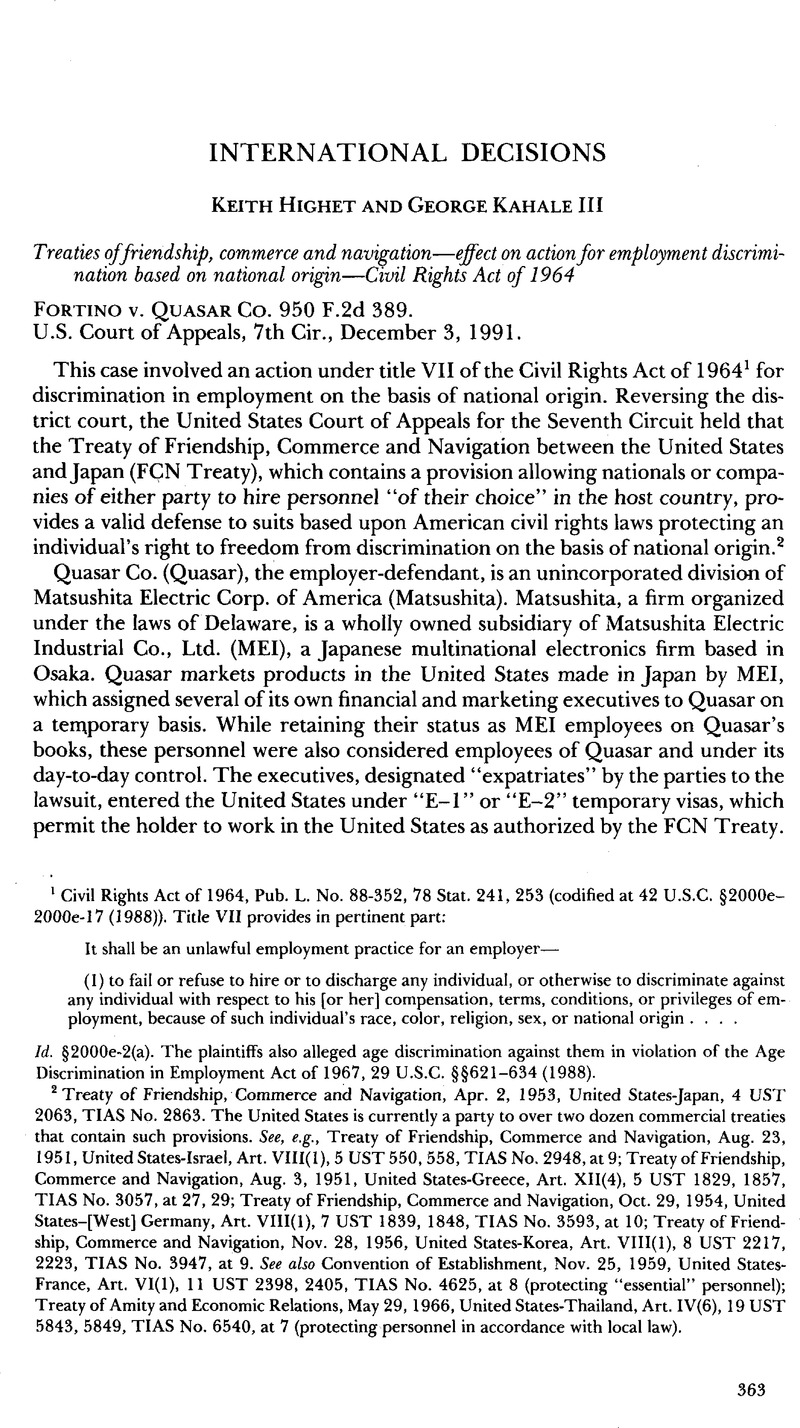No CrossRef data available.
Article contents
Fortino v. Quasar Co. 950 F.2d 389.
Published online by Cambridge University Press: 27 February 2017
Abstract

- Type
- International Decisions
- Information
- Copyright
- Copyright © American Society of International Law 1992
References
1 Civil Rights Act of 1964, Pub. L. No. 88-352, 78 Stat. 241, 253 (codified at 42 U.S.C. §2000e- 2000e-17 (1988)). Title VII provides in pertinent part: It shall be an unlawful employment practice for an employer— (1) to fail or refuse to hire or to discharge any individual, or otherwise to discriminate against any individual with respect to his [or her] compensation, terms, conditions, or privileges of employment, because of such individual's race, color, religion, sex, or national origin .... Id.§2000e-2(a). The plaintiffs also alleged age discrimination against them in violation of the Age Discrimination in Employment Act of 1967, 29 U.S.C. §§621-634 (1988).
2 Treaty of Friendship, Commerce and Navigation, Apr. 2, 1953, United States-Japan, 4 UST 2063, TIAS No. 2863. The United States is currently a party to over two dozen commercial treaties that contain such provisions. See, e.g., Treaty of Friendship, Commerce and Navigation, Aug. 23, 1951, United States-Israel, Art. VIII(l), 5 UST 550, 558, TIAS No. 2948, at 9; Treaty of Friendship, Commerce and Navigation, Aug. 3, 1951, United States-Greece, Art. XII(4), 5 UST 1829, 1857, TIAS No. 3057, at 27, 29; Treaty of Friendship, Commerce and Navigation, Oct. 29, 1954, United States-[West] Germany, Art. VIII(l), 7 UST 1839, 1848, TIAS No. 3593, at 10; Treaty of Friend ship, Commerce and Navigation, Nov. 28, 1956, United States-Korea, Art. VIII(l), 8 UST 2217, 2223, TIAS No. 3947, at 9. See also Convention of Establishment, Nov. 25, 1959, United States- France, Art. VI(1), 11 UST 2398, 2405, TIAS No. 4625, at 8 (protecting “essential” personnel); Treaty of Amity and Economic Relations, May 29, 1966, United States-Thailand, Art. IV(6), 19 UST 5843, 5849, TIAS No. 6540, at 7 (protecting personnel in accordance with local law).
3 Fortino v. Quasar Co., 751 F.Supp. 1306, 1309 (N.D. 111. 1990), rev'd, 950 F.2d 389.
4 FCN Treaty, supra note 2, Art. VIII(l), 4 UST at 2070, TIAS No. 2863, at 9. By virtue of the Treaty, “foreign businesses clearly have the right to choose citizens of their own nation as executives because they are such citizens.” MacNamara v. Korean Air Lines, 863 F.2d 1135, 1144 (3d Cir. 1988) (emphasis in original).
5 950 F.2d at 392.
6 Id. at 393.
7 Id.
8 457 U.S. 176 (1982).
9 Id. at 189 n.l9.
10 950 F.2d at 393.
11 756 F.Supp. 292 (S.D. Tex. 1989).
12 Treaty of Friendship and General Relations, July 3, 1902, United States-Spain, Art. 11(2), 11 Bevans 628, 629.
13 756 F.Supp. at 295.
14 751 F.Supp. 1548 (E.D.N.Y. 1990).
15 42 U.S.C. §1981 (1982), Act of Apr. 9, 1866, ch. 31, §1, HStat. 27,asreenactedin 1870, Actof May31,1870,ch. 114, §§16, 18, 16Stat. 140, 144 (prohibiting racial discrimination in the making of contracts).
16 751 F.Supp. at 1551.
17 Id.
18 Id. at 1552.
19 See Wicks v. Olympic Airways, 745 F.2d 363, 364 (6th Cir. 1984) (Greek company had “narrow right to discriminate in favor of Greek citizens in filling managerial and technical positions within the company's American-based offices"); Speiss v. C. Itoh & Co. (America), 643 F.2d 353, 361 (5th Cir. 1981) ("the only reasonable interpretation is that [the provision] means exactly what it says: Compa nies have a right to decide which executives and technicians will manage their investment in the host country, without regard to host country laws"), cert, dismissed, 454 U.S. 1130 (1982).
20 See MacNamara v. Korean Air Lines, 863 F.2d 1135, 1146 (3d Cir. 1988) (trade treaty between United States and Korea containing “of their choice” provision did not bar title VII claims; the provision “was intended to do no more than entitle a foreign business to favor personnel and prospec tive personnel on the basis of citizenship"); Avagliano v. Sumitomo Shoji America, Inc., 638 F.2d 552, 559 (2d Cir. 1981) ("of their choice” right intended “to facilitate a party's employment of its own nationals [only] to the extent necessary to insure its operational success in the host country"), vacated and remanded on other grounds, 457 U.S. 176 (1982). In Linsky v. Heidelberg Eastern, Inc., 470 F.Supp. 1181 (E.D.N.Y. 1979), the plaintiff, an employee of an American subsidiary of a Danish parent, sued under title VII claiming discrimination based on national origin—specifically, that his termination was due to the fact that he was not Danish. The defendant invoked a provision of a treaty between the United States and Denmark virtually identical to that included in the FCN Treaty. In denying the defendant's motion to dismiss, the court maintained that the history of the treaty provision did not demonstrate that a foreign corporation has an unconditional privilege to hire from a particular cate gory of executive employees in the face of American antidiscrimination laws, and noted that the existence of many treaties containing “of their choice” clauses would provide an “unjustifiable loop hole” with “wide ranging effects for the enforcement of Title VII.” Id. at 1187.
21 950 F.2d at 393.
22 Id. at 394 (citing Sumitomo Shoji America, Inc. v. Avagliano, 457 U.S. 176, 181 n.6 (1982)); cf. Dep't of State Airgram No. 385 from U.S. Embassy, Montevideo, Uruguay, to Dep't of State (Nov. 8, 1949) (United States expressly rejected Uruguayan proposal to modify “of their choice” language with clause, “discrimination against nationals of the other party shall be avoided, and without prejudice to laws designed to protect their employment"). * This summary is based on the French translation of the slip opinion, written originally in English, issued by the Court.




